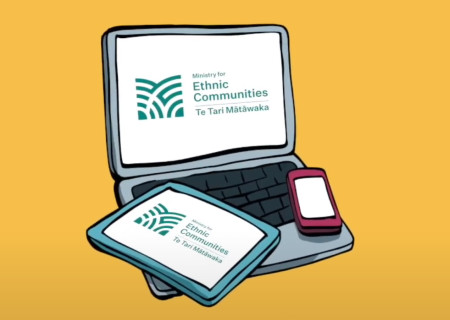On this page
You will need to fill out an application form online. Your project must support the Fund’s purpose and at least one of the Ministry’s four priorities.
What to include in your application
 A successful application needs to:
A successful application needs to:
- show that your project will help an ethnic community or communities
- have a clear start date within the current funding round (1 July – 30 June)
- identify how the project will use the funding within 12 months of receiving the approved funding
- show that the project is well-designed, well-planned, and will be completed in New Zealand
- identify how you have reasonably explored alternative forms of funding
- confirm your project is different to already publicly available services and does not create any duplication of services
- show how your project (excluding events) is different from previously supported projects (relevant to past applicants only).
Additional notes
How projects are prioritised
Priority is given to:
- projects or events that are a collaboration between ethnic community groups and combined into a single application.
- events that are open to the wider community.
Funding decisions
Many groups and organisations apply for our Fund, which means we can’t always grant funding. We may also fund part of your request, but not all.
Funding will not always be approved for the same project or event and may end after several years.
What we do not fund
We do not fund the following types of applications:
- grants to individuals
- grants for capital expenses
- already completed or partially completed projects
- debt repayment or debt servicing
- ongoing salaries or administration costs
Requests for funding ongoing salaries and/or ongoing administration costs that exceed the life of the project/event and could be classed as business as usual.
- projects to make money
Requests specifically intended to generate profit for external distribution. A project may only generate a profit or surplus to invest in the expansion of the applicant’s services or to contribute to the community and voluntary sector (e.g., Social Enterprises).
- projects that promote commercial interests, political objectives or religious ministry
This includes political advocacy, projects that seek to change legislation, and commercial enterprises.
- fundraising
Requests for fundraisers, including commercial or professional fundraisers whose purpose is to distribute money to others.
- where a conflict of interest exists
Requests where there is evidence of a conflict of interest related to the project, which, in the opinion of the decision-makers, has not been disclosed or managed satisfactorily.
- alcohol and similar substances (e.g., kava).
Political neutrality
Projects or events funded by the Fund must remain politically neutral. This means:
- Your project or event, and any printed or online materials, cannot promote or criticise any political party or its members. Public funds cannot be used for political purposes.
- You cannot accept money from any political party if it requires you to publicly acknowledge or endorse that party or its members.
- Project materials must not display or use any political party logos, branding, or identities.
Get help with your application
To get help with your application, contact a Community Funding Advisor at ecdf@ethniccommunities.govt.nz or call 0800 656 656.
The Ministry’s priorities
The following outlines our priorities and includes examples of how your project or event may fit within them.
1. Promote diversity and inclusion
Take action to promote the value of diversity and improve the inclusion of Ethnic Communities.
Examples:
- celebration of cultural and religious festivals and national or remembrance days
- events showcasing cultural performances, art, drama, language or food
- social inclusion programmes
2. Ensure equitable access to government services
Ensure equitable provision of, and access to, government services for Ethnic Communities.
Examples:
- mental health workshops for Ethnic Communities
- community resilience and recovery projects
- creating culturally appropriate radio programmes
3. Improve economic outcomes
Develop and support initiatives to improve economic outcomes, including addressing barriers to employment.
Examples:
- capability building or development programmes
- entrepreneurial workshops
- CV writing and interview training workshops
- building digital skills workshops
- small business projects for new settlers and their families
4. Connect and empower Ethnic Communities
Work to connect and empower ethnic community groups.
Examples:
- cross-cultural parenting programmes
- water confidence classes for migrant women and children
- leadership development and support for migrant and refugee youth
- cultural identity and community spirit workshops
- senior people events
- youth sports events and tournaments
